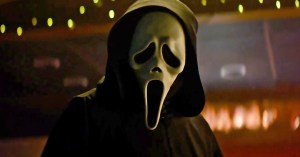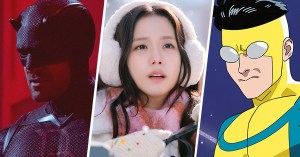Five Favorite Films with Richard Kelly
The director of The Box and Donnie Darko talks Kubrick and the merits of being ambiguous.
Is it possible that after only two films (his cult hit debut Donnie Darko and his infamously panned follow-up, Southland Tales), director Richard Kelly has already achieved auteur status? Audiences will find out this Halloween, when Kelly’s next film, The Box, opens in theaters. Based on Richard Matheson’s short story Button, Button, the old-fashioned thriller follows a married couple (Cameron Diaz and James Marsden) who are given a choice: if they push a button they’ll receive one million dollars, but someone somewhere will die. Rotten Tomatoes spoke with Kelly in San Diego just hours before he debuted extended footage from The Box and discussed his favorite films, the genesis of The Box, and his hopes to return to Southland Tales with an eventual Director’s Cut.
2001: A Space Odyssey (1968,
96% Tomatometer)
It pioneered everything, and it’s a film that says pretty much everything that needs to be said about our species (laughs). It was just such a groundbreaking film on every level. I don’t know if anyone has broken ground quite in the way that Kubrick did with that film.
Barry Lyndon (1975, 94% Tomatometer)
On the flipside, Barry Lyndon, for me, is the most beautiful film ever made, for its beauty and also for its statement about our hubris as a species, in the character of Barry Lyndon being a fool who destroys everyone around him. After that it’s really murky.
Close Encounters of the Third Kind
(1977, 95% Tomatometer)
My favorite Spielberg film is probably Close Encounters of the Third Kind.
The Big Lebowski (1998, 77% Tomatometer)
Who’s another director I like? My favorite Coen Brothers film has gotta be The Big Lebowski.
Next: Kelly talks about the merits of ambiguity in cinema, and why The Box is his most personal film.
RT: So what of The Box will be show at Comic-Con?
RK: It’s a four and a half minute montage that I cut together. It has the score from the film, so I’m really excited for everyone to see it.
RT: What interested you in The Box?
RK: This was a short story that I optioned about six years ago, so I’ve been trying to figure out how to turn it into a film for several years now. In 2006, it finally all clicked for me. I figured out how to crack the story. The timing was right, and I felt like I wanted to make this my third film. I felt I wanted to go back and make a film in Virginia, where I grew up. [I wanted] to take my parents and my family and the elements of their lives and merge it with Richard Matheson’s short story, to flesh out Arthur and Norma in a very personal way, and to do an old-fashioned suspense film. It’s kind of an old-fashioned film in the sense that there’s not one swear word in it, there’s very little violence ultimately. It’s a very suspenseful film that I hope we’ve made, in the tradition of the kinds of films that my parents grew up with. I guess it would be Alfred Hitchcock who’s someone that I think of. My parents introduced me to Alfred Hitchcock films.

RK: Yeah, it has this tantalizing concept of this button that could cause the death of another human being. And receiving a million dollars for it — that’s a question that you could propose to anyone. I think it’s interesting to think about how many people would go through with it (laughs), and to think about why they would go through with it. Arthur’s a scientist, and he looks at this button unit, and there’s no technology in it. It’s a piece of wood. When he opens it up, the button doesn’t do anything. And so, in his mind, push it! There’s no way this could cause the death of another human being. Push it a hundred times. Who cares? It’s just superstition. But then, when you get into the idea of, is there something greater at work? Is there some sort of magic or a higher power at work? That’s when Arthur’s made to believe, OK, this is real. And Mr. Stewart has some sort of greater ability.
RT: Are we speaking in religious terms here?
RK: I think we’re talking about science and religion, and ultimately, some sort of supernatural entity that is kind of controlling all of this that Mr. Stewart has access to. That’s part of the investigation into the mystery.
[rtimage]MapID=1189532&MapTypeID=2&photo=1&legacy=1[/rtimage]
RT: Do feel like your fans will see this as a “Richard Kelly film?”
RK: I hope so. I’ve taken something that was six pages long, that was Richard Matheson’s creation, and I’ve been very reverential to it. But I’ve definitely brought a lot [to it]. It’s the most personal film I’ve ever made. At the same time, it’s also my first studio film, and [it’s] more mainstream than the previous two films. It feels very much like something that people would expect from me, I guess (laughs). Specifically with Donnie Darko; I think it feels tonally similar to Donnie Darko in a lot of ways.
RT: I appreciate the fact that Donnie Darko doesn’t spell out its meaning. Is that something you strive for in all of your films?
RK: I always like that there’s a degree of ambiguity, and that there’s a lot for people to digest and think about. I hope to always make films that people can watch more than once and continue to see new things, because for me, those are the films that continue to age well. At the same time, it’s also about giving people enough answers so that they don’t feel alienated of confused. It’s about finding that balance in the middle.
[rtimage]MapID=1165830&MapTypeID=2&photo=17&legacy=1[/rtimage]
RT: I found Southland Tales fascinating. Does that movie still stay with you?
RK: I’m so proud of that film. What I really want to do is to be able to go back and do a longer director’s cut of it at some point. There are still some unfinished visual effects that I’d like to do. And then the whole graphic novel prequel, that will always stay with me, and I hope that one day I’ll get to revisit all of that.
RT: What’s the optimal length you’re thinking of?
RK: I’d love to put an additional 10 or 15 minutes back into the film. Then, I’d love to do the whole prequel saga as an animated motion-capture film at some point. If the actors aren’t all in wheelchairs by that point (laughs).
Click here for more Comic-con coverage, and here for Kelly’s complete filmography.
Get our latest Comic-Con 2009 updates here:







